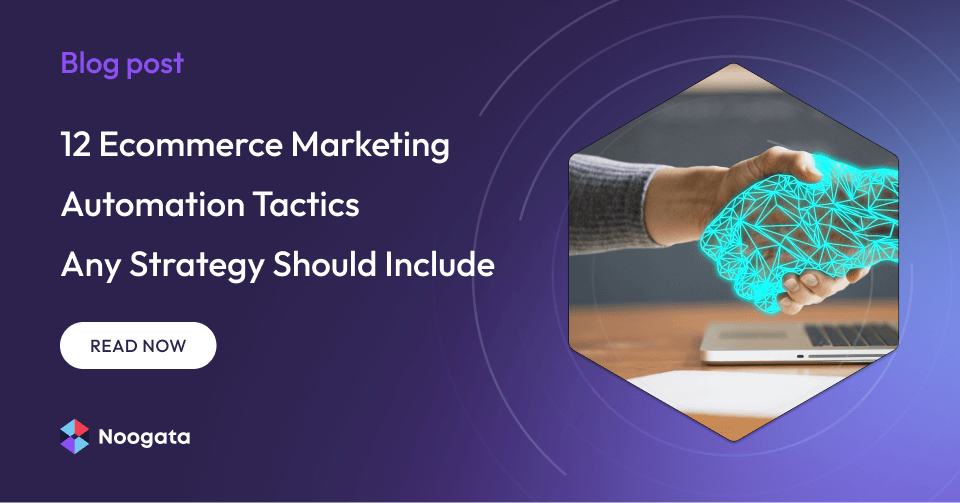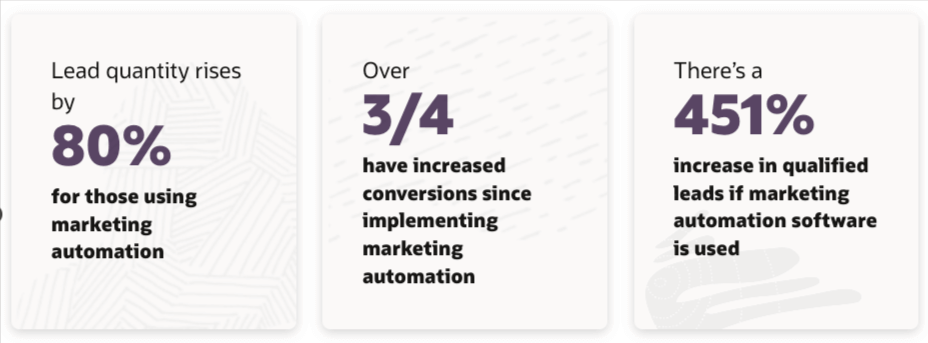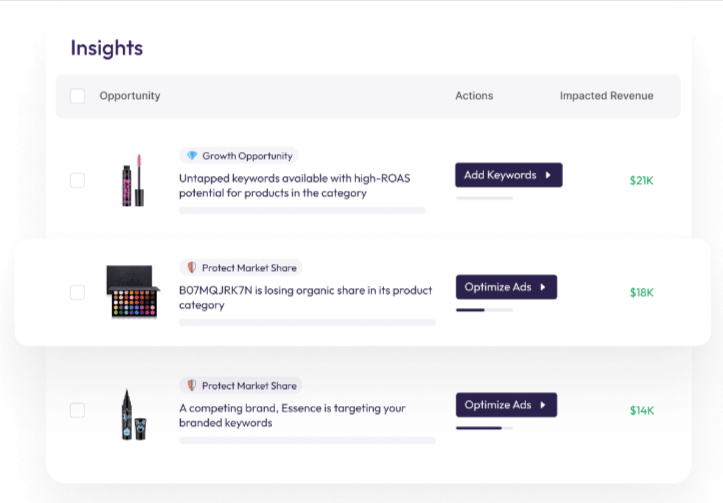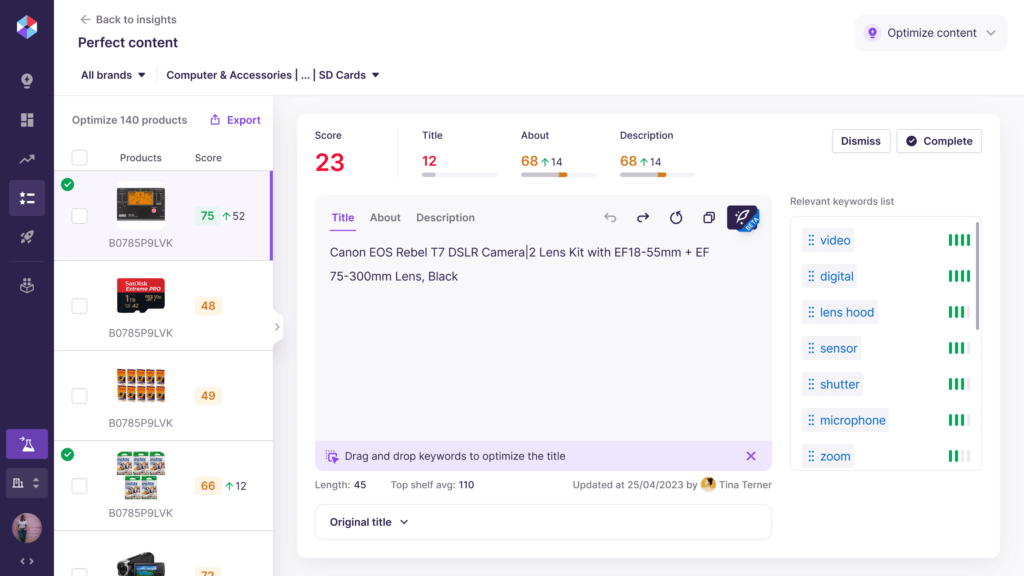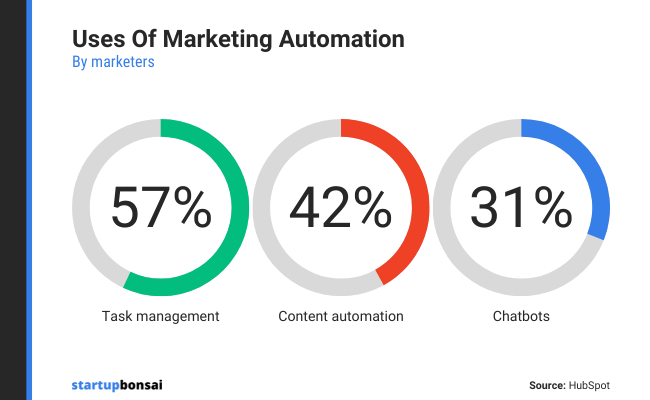For eCommerce teams juggling vast product portfolios across numerous channels like Amazon, Walmart, and other direct-to-consumer platforms, automation isn’t just about efficiency but survival and growth in an intensely competitive landscape. Today, it’s no longer a question of whether to automate, but how comprehensively and intelligently the technology can be leveraged.
Why? Because it gets results, plain and simple. Effective marketers are 46% more likely to have implemented automation than those who report less success. Additionally, research shows that 80% of marketers using automation generate more leads than those who don’t. These statistics underscore the power of eCommerce marketing automation to enable businesses to achieve more without inflating their workload or budgets.
Let’s examine the top tactics a winning eCommerce marketing automation strategy should include, focusing on how they streamline operations, create new opportunities for customer engagement, and increase revenues.
The Benefits of Ecommerce Marketing Automation
Enhanced Customer Personalization
Automation allows for simplified collection and analysis of detailed customer data. This insight enables teams to tailor marketing efforts to individual preferences, leading to more engaging and personalized customer experiences.
Increased Operational Efficiency
Ecommerce teams can focus on strategy and creative endeavors by automating routine tasks. This shift saves time and reduces the potential for human error, ensuring smoother operations.
Scalability
As your business grows, the ability to scale your marketing efforts efficiently becomes crucial. Automation supports this growth without the need for proportional increases in staffing or resources.
Data-Driven Decision Making
Real-time data analysis provided by automation tools offers valuable insights into the competition, customer behavior, and market trends, enabling more informed and strategic decision-making.
Improved Customer Retention
Automated campaigns can nurture customer relationships through timely and relevant engagement, significantly improving retention rates.
Optimized Marketing Spend
With detailed tracking and analytics, marketing automation ensures that every dollar spent is accounted for and optimized for maximum ROI.
Consistency Across Channels
Automation ensures a consistent brand message and customer experience, whether the customer interacts with your brand on Amazon, Walmart, or other platforms.
12 Strategic Ecommerce Marketing Automation Tactics
Here are a dozen essential marketing automation tactics that can revolutionize how eCommerce businesses operate and interact with their customers:
1. Email Marketing Automation
Automate welcome emails, abandoned cart reminders, and personalized product recommendations. This tactic enhances customer engagement and drives conversions by providing timely, relevant content. Besides boosting sales, this method keeps your brand top-of-mind, encouraging repeat purchases and long-term customer loyalty.
How to implement it: Utilize email marketing tools to send automated, triggered emails based on customer actions like first-time sign-ups, cart abandonment, or browsing history.
2. AI Ecommerce Analytics Platform
Utilizing AI-driven insights to spot market trends and increase sales is crucial for platforms like Amazon. By leveraging this technology, businesses can outperform the competition by quickly adapting to market changes and consumer preferences.
How to implement it: Integrate Noogata’s platform to provide real-time analytics, competitive intelligence, and actionable product and campaign optimization insights.
3. Social Media Marketing Automation
Automate the scheduling of social media posts, responses, and ad targeting based on user behavior. It saves time and ensures a consistent online presence. Automated analytics can also provide insights into the best times to post and the types of content that resonate most with your audience.
How to implement it: Use social media management tools to schedule posts and set up automated responses for common inquiries.
4. Customer Segmentation and Personalization
Segment audiences using customer data, enabling more tailored and compelling marketing messages. This approach increases conversion rates and enhances the overall customer experience by making marketing communications feel more relevant and personal.
How to implement it: Leverage CRM systems to analyze customer data and behaviors, creating distinct segments for targeted marketing efforts.
4. Retargeting and Remarketing Campaigns
Target customers who showed interest but didn’t purchase. It helps in recapturing lost sales opportunities. This tactic is especially effective as it reconnects with users who have already expressed interest, significantly increasing the likelihood of conversion.
How to implement it: Use retargeting tools on ad platforms and automated emails for customers who visit specific product pages.
6. Search Engine Optimization (SEO)
Use automated tools to optimize product pages for better search rankings. Effective SEO automation drives more traffic and improves the overall user experience, resulting in increased engagement and sales.
How to implement it: Take advantage of AI-powered SEO tools that analyze and suggest improvements for product descriptions, keywords, and other on-page elements.
7. Inventory Management Automation
Automate tracking and managing inventory to prevent stockouts and overstock situations. Effective inventory management also helps maintain customer satisfaction by avoiding delays or issues with product availability and building your brand’s reputation.
How to implement it: Use inventory management systems that automatically reorder stock based on predefined thresholds.
8. Review and Feedback Automation
Automate review requests post-purchase. It boosts reputation and provides valuable customer feedback. Collecting customer feedback is critical for continuous improvement and helps build trust with potential buyers.
How to implement it: Set up automated emails or SMS messages requesting reviews and feedback after product delivery.
9. Dynamic Pricing
Adjust prices automatically based on various factors like demand and competition. This strategy helps in staying competitive and maximizing profits. Dynamic pricing maximizes profitability and keeps pricing strategies agile in a fluctuating market.
How to implement it: Utilize dynamic pricing software that analyzes market data and adjusts prices in real-time.
10. Chatbots and AI Customer Service
Deploy AI chatbots for instant customer support. It enhances customer experience and handles queries efficiently. This automation is essential to providing immediate customer assistance, reducing wait times, and increasing overall customer satisfaction.
How to implement it: Integrate AI chatbot solutions that handle taking orders, FAQs, order tracking, and basic support functions.
11. Order Fulfillment and Shipping Automation
Streamline order processing and provide timely updates. It improves operational efficiency and customer satisfaction, crucial for maintaining a good brand reputation and ensuring customer loyalty through consistently reliable service.
How to implement it: Use automated systems that manage order fulfillment processes and send tracking updates to customers.
12. Loyalty Program Management
Automate loyalty program operations for effective customer retention and engagement. These programs foster a sense of value and appreciation among customers, encouraging them to continue choosing your brand.
How to implement it: Utilize a system that manages points accumulation and redemption and sends personalized offers based on customer activity.
Revolutionize Your eCommerce Marketing Automation Strategy with AI Power
In today’s eCommerce landscape, marketing automation is a pivotal factor for success. From personalized email campaigns to dynamic pricing and AI-driven analytics, each tactic streamlines operations, enhances customer engagement, and boosts sales. Automation tools allow Commerce teams to manage extensive product portfolios more effectively and create a more satisfying, personalized customer experience.
AI and machine learning’s growing role is only going to increase the efficacy of eCommerce marketing automation. Noogata leads the way in eCommerce AI, especially with its AI Amazon Assistant. This powerful feature brings a new level of sophistication to eCommerce marketing automation, offering unparalleled insights into market trends, competitive intelligence, consumer behavior, and listing optimization.
Specifically tailored for platforms like Amazon, Noogata’s advanced capabilities help eCommerce teams stay ahead in a highly competitive market, ensuring their marketing efforts are effective and impactful.
Try a demo today to witness how Noogata’s cutting-edge solution will revolutionize your eCommerce marketing automation strategy.
